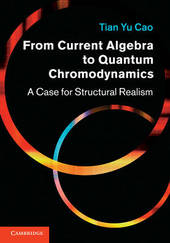
|
From Current Algebra to Quantum Chromodynamics: A Case for Structural Realism
Hardback
Main Details
| Title |
From Current Algebra to Quantum Chromodynamics: A Case for Structural Realism
|
| Authors and Contributors |
By (author) Tian Yu Cao
|
| Physical Properties |
| Format:Hardback | | Pages:318 | | Dimensions(mm): Height 253,Width 178 |
|
| Category/Genre | History of science |
|---|
| ISBN/Barcode |
9780521889339
|
| Classifications | Dewey:539.7548 |
|---|
| Audience | | Professional & Vocational | |
|---|
|
Publishing Details |
| Publisher |
Cambridge University Press
|
| Imprint |
Cambridge University Press
|
| Publication Date |
14 October 2010 |
| Publication Country |
United Kingdom
|
Description
The advent of quantum chromodynamics (QCD) in the early 1970s was one of the most important events in twentieth-century science. This book examines the conceptual steps that were crucial to the rise of QCD, placing them in historical context against the background of debates that were ongoing between the bootstrap approach and composite modeling, and between mathematical and realistic conceptions of quarks. It explains the origins of QCD in current algebra and its development through high-energy experiments, model-building, mathematical analysis and conceptual synthesis. Addressing a range of complex physical, philosophical and historiographical issues in detail, this book will interest graduate students and researchers in physics and in the history and philosophy of science.
Author Biography
Tian Yu Cao is the author of Conceptual Developments of 20th Century Field Theories (1997) and the editor of Conceptual Foundations of Quantum Field Theory (1999), also published by Cambridge University Press.
ReviewsReview of the hardback: 'Tian Yu's book is a penetrating treatment of the physics involved, but with many philosophical asides, that he alone can produce effortlessly. I have enjoyed reading it enormously.' Michael Redhead, Professor Emeritus, University of Cambridge, FBA 'Cao's book provides many historical and conceptual insights into the fascinating development of QCD.' Vincent Lam, Philosophy in Review
|